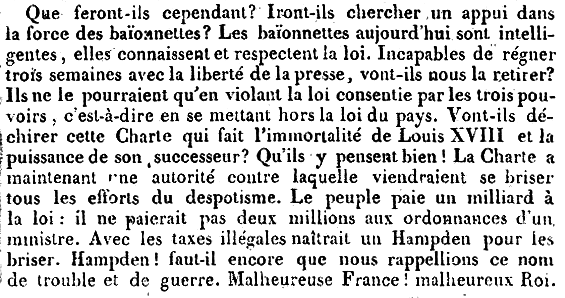On this date in 1829, in response to Charles Ⅹ’s attempt to govern autocratically and in the face of the opposition of France’s elected legislature, the Journal des Débats editorialized as follows:
The Charter now has an authority against which all the efforts of despotism will fail. The people will pay a billion to the law; they will not pay two million to the ordinances of a minister. Were illegal taxes to be demanded, a Hampden would arise. Hampden! a name that reminds us still of disorder and war. Woe to France! woe to the king.

The author of that sideways call to tax resistance (with its shout-out to famous English tax resister John Hampden) was then prosecuted by the crown. He was convicted, but then won acquittal on appeal. Tax resistance was not an idle threat, as groups like the Breton Association (a.k.a. League of Breton Resistance) and “Help Yourself and Heaven Will Help You” were forming to coordinate resistance to taxes.
By the following year, the king had decided to double-down on his autocratic policies, but the country responded by getting further out of control. The press began simply disregarding censorship and declaring the monarchy to have lost the authority to rule, and by mid-year, insurrectionists were building barricades in the streets of Paris, and Charles was forced to abandon the throne and flee to England.
